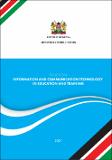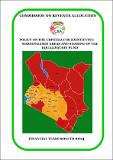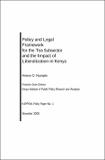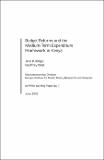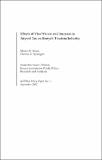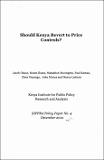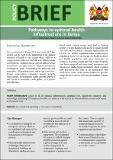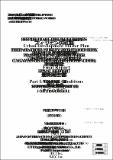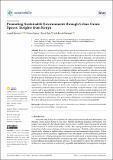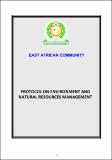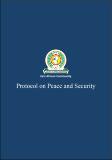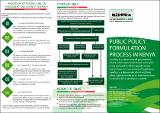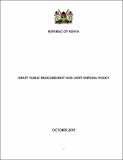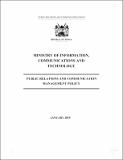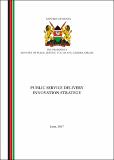Browsing by Title
Now showing items 2512-2531 of 3589
-
Policy on Information and Communication Technology in Education and Training 2021
(Ministry of Education, 2021)The Policy on Information and Communication Technology in Education and Training highlights the importance of quality education in achieving Kenya's Vision 2030 and producing globally competitive human capital. The government ... -
Policy on the Criteria for Identifying Marginalised Areas and Sharing of the Equalisation Fund 2013
(Commission on Revenue Allocation, 2013)The Commission on Revenue Allocation (CRA) was established in accordance with Article 215 of the Constitution of Kenya. Article 216 (4) of the Constitution requires the Commission to determine, publish and regularly review ... -
Policy Paper No. 01 of 2000 on Policy and Legal Framework for the Tea Subsector and the Impact of Liberalization in Kenya
(The Kenya Institute for Public Policy Research and Analysis (KIPPRA), 2000)Growth in tea production in Kenya has slowed in recent years. This slowdown is attributed partly to policy reforms in the industry, which reduced government control on providing production, processing and marketing ... -
Policy Paper No. 02 of 2001 on Policy and Legal Framework for the Coffee Subsector and the Impact of Liberalization in Kenya
(The Kenya Institute for Public Policy Research and Analysis (KIPPRA), 2001)A major concern in liberalizing the coffee trade is the need to harmonize the legal framework with policy reform. In particular, the legal framework must change so the institutions previously involved in controlling ... -
Policy Paper No. 03 of 2001 on Effects of Visa Waiver and Increase in Airport Tax on Kenya's Tourism Industry
(The Kenya Institute for Public Policy Research and Analysis (KIPPRA), 2001)This paper analyses the likely impact of the visa waiver introduced in June 1999 and the increase in airport tax in December 1999 on Kenya’s tourism industry. The visa waiver policy was intended to resuscitate the tourism ... -
Policy Paper No. 04 of 2010 on Should Kenya Revert to Price Controls?
(The Kenya Institute for Public Policy Research and Analysis, 2010)Prices of many essential items (including food items) in Kenya have sharply risen in the last few years. Such rises can have adverse consequences, including political and economic instability. In an attempt to address ... -
Policy Paper No. 05 of 2013 on A Comparative Study on Public-Private Sector Wage Differentials in Kenya
(The Kenya Institute for Public Policy Research and Analysis (KIPPRA), 2013)One of the key issues of public debate and attention in Kenya is the difference in wages between the public and private sector, which has made it difficult for the public sector to attract and retain talent. While surveys ... -
Policy Paper No. 06 of 2020 on Guidelines for Public Policy Development and Review
(The Kenya Institute for Public Policy Research and Analysis (KIPPRA), 2020)KIPPRA’s overall mandate is to provide quality public policy advice to the Government of Kenya and other stakeholders and improve public policy making for the realization of national development goals. KIPPRA does this ... -
Policy Pathways to Optimal Health Infrastructure in Kenya 2020
(Government of Kenya, 2020)The constitution of Kenya 2010 and vision 2030 has spelled out the right to the attainment of the highest standard of health to the citizen which calls for a comprehensive effective and efficient infrastructure development. ... -
Presidential Circular No.1 /2007 on Organization of The Government of the Republic of Kenya
(Office of The President, 2007-01)Presidential Circular No. 1/2007 on the Organization of the Government of the Republic of Kenya establishes a framework for the structure and functioning of the government. The circular outlines key principles and guidelines ... -
The Project on Integrated Urban Development Master Plan for the City of Nairobi in the Republic of Kenya
(County Government of Nairobi, 2014)Nairobi is the capital city of Kenya and one of the most important economic centres in East and Central Africa. It accounts for 50% of formal employment in Kenya and generates over 50% of the country’s gross domestic product ... -
Promoting Sustainable Environments through Urban Green Spaces: Insights from Kenya
(Sustainability Journal, 2023)Abstract: Kenya has experienced rapid population growth and urbanization in recent years leading to major changes in its natural environment. Urban infrastructure has a significant influence on carbon emissions and ... -
Protocol on Environment and Natural Resources Management 2015
(East African Community, 2015)The Republic of Burundi, the Republic of Kenya, the Republic of Rwanda, the United Republic of Tanzania, the Republic of Uganda and the Republic of South Sudan (hereinafter referred to as "the Partner States") signed the ... -
Protocol on Peace and Security 2012
(East African Community, 2012)The objective of this Protocol is to promote peace, security, and stability within the Community and good neighbourliness among the Partner States. Without prejudice to paragraph 1, the Partner States undertake to: protect ... -
Protocol on the Establishment of the East African Community Monetary Union 2013
(East African Community, 2013)In order to promote the objectives of the Community under Article 5 of the Treaty and in accordance with the provisions of this Protocol, the Partner States hereby establish a Monetary Union. The objective of the Monetary ... -
Public Policy Formulation Process in Kenya
(The Kenya Institute for Public Policy Research and Analysis (KIPPRA), 2018)A policy is a statement of government intention which articulates basic principles to be pursued to attain specific goals and actions. in the context of legislation, a policy ids a document which outlines what a government ... -
Public Procurement and Asset Disposal Policy 2019
(The National Treasury and Planning, 2019)The Public Procurement and Asset Disposal System in Kenya has evolved from a system which had no regulations to a legally regulated procurement and asset disposal system in line with International Standards. The Government ... -
Public Relations and Communication Management Policy 2019
(Ministry of Information, Communications and Technology, 2019)The role of Public Relations and Communication Management in Government Ministries, Departments and Agencies (MDAs) entails among other functions identifying significant events which require packaging of Government information ... -
The Public Sector Wage Policy Study
(Ministry of Finance, 2004-07)This Policy discusses the growth of public sector employment in Kenya from independence to the early 1990s, highlighting how civil service employment increased by 4.4% annually, while public employment in other sectors ... -
Public Service Delivery Innovation Strategy 2017
(Ministry of Public Service, Youth and Gender Affairs, 2017)Society is facing complex social and economic challenges, largely characterized by poverty, disease pandemics, conflict, unemployment, food insecurity and environmental degradation. While governments have over the decades ...

